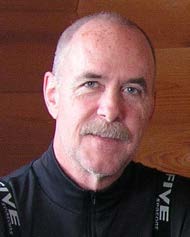From the Editor - January 2016
|
In the Your Board in Action column this month, Editor-elect Tami Shannon has eloquently outlined some of the key benefits of stepping-up our participation in HGS activities, especially in these uncertain times when maintaining and building our professional networks, and technical knowledge, is so important. Allow me to augment Tami’s good message by also encouraging your involvement in volunteering opportunities beyond HGS. I’ll highlight one example (among many) of how we Houstonian geoscientists can have a positive impact on our colleagues around the world—befitting Houston’s privileged status as the capital of the global petroleum industry. |
The American Association of Petroleum Geologists (AAPG) Publication Pipeline Committee’s (PPC) primary goal is to be a “pipeline” of donated geoscience publications, both books and journal sets, to requesting and qualified overseas universities. Shipments are made with the assistance of AAPG members and staff, AAPG Student Chapters, affiliated societies, and companies with overseas operations. The PPC’s base of operations is right here in Houston, at 6830 North Eldridge Parkway. To date the committee has shipped to more than 50 universities in 18 countries, reaching an untold number of geoscience students and faculty.
Founded in 2000 by my former Amoco colleagues Martin Cassidy and Rick Wall, the PPC currently has a total of 11 members based in Houston as well as a number of other members and “friends of the PPC” scattered around the world that periodically assist in gathering donated publications, as well as identifying and facilitating contact with potential university recipients. By 2013, the PPC had shipped more than 100 tons of geoscience publications to universities around the world, and the committee is proud to announce it is already approaching the 200 ton milestone (see graph on page 9).
AAPG PPC members have the opportunity to “champion” specific donations/shipments, wherever potential university recipients can be identified. “Championing” involves making sure that the necessary documents formalizing the request are submitted from university officials to the PPC, determining the maximum quantity of publications that the university can shelve in an accessible space protected from the elements, engaging the services of an international shipping company willing and able to ship the inventoried/boxed/palletized publications to locations that are sometimes quite remote, and seeking organizations to serve as sponsors to help facilitate importation and/or underwrite the costs of the shipment.
I’ve had the pleasure of seeing the successful conclusion to one of our most recent PPC projects, for which I served as “champion,” to Yangon University and other universities with geoscience departments in Myanmar, Southeast Asia. AAPG, the Myanmar Geosciences Society, Chevron, Schlumberger, and Statoil all kindly offered to co-sponsor a PPC shipment. As Myanmar (formerly Burma) was essentially closed to the outside world for nearly 5 decades, the need for building/modernizing their university library collections in this country is even greater than usual. When I visited the Geology Department at Yangon University back in August 2014, the most recent hardcopy publications in their small library dated from the early 1960’s. And like many places, there is still no access, or at best difficult access, to the online publications that many of us now take for granted.
Fortunately, earlier in 2014 the PPC had received a very generous offer of the entire library collection of the UT Austin Bureau of Economic Geology’s (BEG) Houston Research Center, which contained the bulk of the former library of Unocal that had been donated to the BEG by Chevron after the merger in 2005. The BEG Houston library ended up filling 60 pallets, the equivalent to almost a kilometer of shelved publications. Normally, a university library would have difficulty accommodating such a large additional volume of books and journals, but in another stroke of good fortune for the project, the Government of Myanmar in recent years had ordered that the Geology Department and other departments at Yangon University be decentralized, and students and professors spread around the country at many different universities outside the capital. This resulted in many spare, unused classrooms in the home of Yangon University’s Geology Department, Mandalay Hall, a substantial 3-story building built during the British colonial era. The last challenge in ensuring the collection could be properly housed for use by students and faculty was the need for a significant number of bookshelves for those empty former classrooms, now to be converted to library space. For that, various members of the Myanmar Geosciences Society (an affiliate of AAPG) came to the rescue, and either donated existing bookshelves or offered to fund the construction of new ones. A happy ending, indeed.
Current “core” (Houston-based) members of the PPC are: Art Browning (Chairman), José Guzman (Treasurer), yours truly (Secretary), Martin Cassidy, Chuck Caughey, Elizabeth Desser, Dave Drowley, Gretchen Gillis, Brian Wall, Meagan Wall, and Gerrit Wind. As the efforts of the committee continue to grow, we will need more “hands on deck,” so we would love to add your name to the PPC members list!
Anyone interested in either 1) becoming a member of the PPC, or 2) donating the part of your personal geoscience library that’s gathering dust, please contact me at jonblickwede.hgs@gmail.com or (832) 228-6593. It’s a fun and fulfilling way to “pay it forward” to new generations of professional geoscientists around the globe!
All the best to you in 2016!

